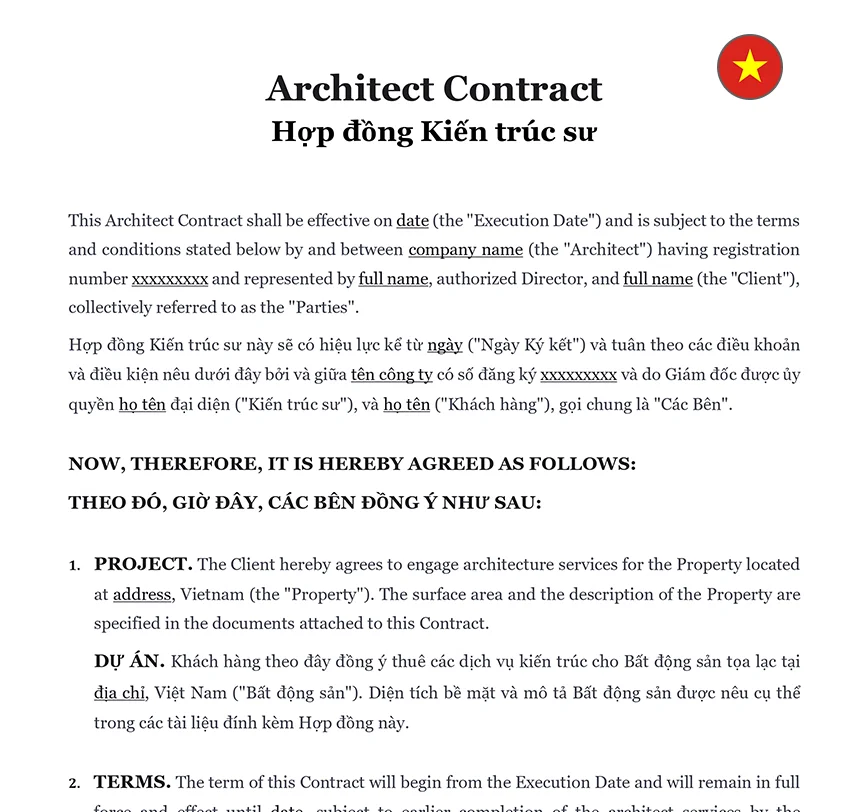Ready to use legal template
Drafted by experienced lawyers
Vietnamese-English translation
Ready to use legal template
Drafted by lawyers
Vietnamese-English translation
Home › Buy a property › Architect contract
Learn more about Architect Contract in Vietnam
Discover our Architect Contract, designed for seamless collaborations in Vietnam’s architectural landscape. This comprehensive document, meticulously drafted by our legal team, ensures legal compliance and clarity on project scope, payments, timelines, and dispute resolution. Presented in an editable Word format, it offers practicality and ease of customization, making it the ideal choice for architects and clients seeking a solid legal foundation for their projects. Trust Themis Partner law firm for your architectural contracts and embark on your projects with confidence and legal clarity.
Table of contents
-
What is an Architect Contract?
-
What does an Architect Contract include?
-
Are there any specific regulations in Vietnam?
-
What are the main responsibilities of the architect in the contract?
-
Can the client terminate the contract early in Vietnam?
-
What happens if there are changes to the project after signing the contract?
-
What happens if I don't have an Architect Contract in Vietnam?
-
Can it be used for both residential and commercial projects?
-
Can I cancel an Architect Contract once it's signed?
What is an Architect Contract?
An Architect Contract is a fundamental agreement that establishes the terms of engagement between an architect and a client in Vietnam. This contract is a detailed roadmap, defining key aspects of the project such as the scope of work, project timeline, payment structure, and the roles and responsibilities of each party. It serves as a crucial document to protect the interests of both the architect and the client, ensuring that the project progresses smoothly and according to plan.
Our Architect Contract goes beyond mere legalities; it’s a commitment to excellence and professionalism. Crafted by legal experts with a deep understanding of Vietnam’s legal landscape, our contract is designed to provide clarity, confidence, and peace of mind throughout the architectural project. With our “Architect Contract,” you can embark on your project with the assurance that your interests are protected and that you have a solid legal foundation for a successful collaboration.
What does an Architect Contract include?
An Architect Contract typically includes several key elements to ensure clarity and protect the interests of both parties. These elements may vary based on the specifics of the project and the preferences of the parties involved, but commonly include:
1. Parties Involved
Identification of the architect and the client, including contact information.
2. Scope of Work
Detailed description of the architectural services to be provided.
3. Project Timeline
Schedule for completion of various project milestones.
4. Fees and Payment Terms
Details of the architect’s compensation, including payment schedule and any additional expenses.
5. Intellectual Property Rights
Ownership of design plans and other intellectual property related to the project.
6. Insurance and Liability
Provisions for professional liability insurance and limitation of liability.
7. Termination Clause
Conditions under which either party can terminate the contract.
8. Dispute Resolution
Procedures for resolving disputes that may arise during the project.
Are there any specific regulations in Vietnam?
Yes, there are specific regulations in Vietnam that govern architectural contracts and construction projects. These regulations are primarily aimed at ensuring safety, quality, and compliance with local laws. Some key regulations and considerations include:
| ➤ Construction Permits: Projects must obtain the necessary permits from local authorities before construction can begin. |
| ➤ Building Codes: Compliance with Vietnamese building codes and standards is mandatory to ensure the safety and quality of construction. |
| ➤ Contractual Laws: Contracts must comply with Vietnamese contract laws, including provisions related to contract formation, validity, and enforceability. |
| ➤ Intellectual Property Laws: Protection of intellectual property rights, including architectural designs, is governed by Vietnamese intellectual property laws. |
| ➤ Labor Laws: Compliance with labor laws, including regulations related to wages, working hours, and safety standards for construction workers. |
| ➤ Environmental Regulations: Projects must comply with environmental regulations, including measures to mitigate environmental impact and ensure sustainability. |
| ➤ Tax Laws: Tax implications related to construction projects, including value-added tax (VAT) and corporate income tax (CIT). |
| ➤ Dispute Resolution: Procedures for resolving disputes, including litigation, arbitration, or mediation, as per Vietnamese laws. |




